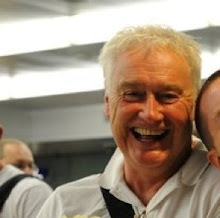“You need to let your pirate out” says
Captain Hook, advising James Barrie to reduce the glucose content in his story
and allow its darker elements to triumph. The writers could have taken the same
advice in their construction of Finding Neverland “The New Musical Comedy”. Whilst the second act is touching
and moving once Barrie gets Peter Pan off the ground, so to speak, the first is
sluggish and unfocused and does no service to historical accuracy.
Barrie was undeniably homosexual, and maintained
a dubious interest in small boys which might have got him into trouble had it
not been for the disbelieving morality of the day. His fascination with the Llewellyn-Davies brothers parallels
Lewis Carroll’s infatuation with Alice Liddell and her sisters and will shortly
be explored by Judi Dench and Ben Whishaw when, in John Logan’s new play Peter and Alice those two characters meet in later life.
Finding Neverland presents Barrie as a shy
romantic whose affections are captured by widowed mother, Sylvia,
with whom he eventually falls in love, whilst developing a healthy outdoor
friendship with her four sons on whom he tests his tales of piracy and
derring-do. This is wayward,
because the boys’ father Arthur didn’t die until three years after Peter Pan
opened and when mother later succumbed to cancer, “Uncle Jim” Barrie
interfered with a version of her Will to have himself nominated as the person
with whom the boys should live.
Peter committed suicide, George died in
battle on the Somme, Michael drowned at 20 in suspicious circumstances at
Oxford, with his alleged male lover. See what I mean, there’s an infinitely better and darker
story here although possibly not for a musical.
The sins of historical omission and
commission are directly attributable to the movie, of course, but it feels more
immediately ‘wrong’ in the theatre and by sticking to the sanitized
made-for-middle-America Miramax treatment, the writers have constructed a show
with more spoonfuls of sugar than Mary Poppins, which it too closely resembles. Producer Harvey Weinstein’s argument
would be that it makes it palatable to family audiences: that may be its fatal
flaw in a post-Matilda world where children respond to more ambitious
plotlines.
In Rob Ashford’s uneven production, it’s hard
to define this as musical comedy, there are so many conflicting elements:
Julian Ovenden and Rosalie Craig look handsome and sing beautifully at the
centre of a slow burning married-boy-meets-widowed-girl romance, as does Clare
Foster as the third wheel Mary Barrie.
They don’t seem to be in the same play as Oliver Boot’s camp Captain
Hook who appears as Barrie’s alter ego and conscience, a structure which pales
by comparison with The Carroll Myth, Nathan Shreeves' fine play
premiered at the Edinburgh Festival last year and in which the characters from
Alice invade the author’s mind.
Hook is only a loveable rogue in recent animated movies and for pantomime purposes, 1904 audiences would have found him genuinely frightening. Also batting for the panto team are the
League Of Gentlemen cartooned as Barrie’s best mates, and Stuart Neal
overacting as Barrie’s harassed stage manager. The schoolboys sing brightly and act by numbers, although
none of them is a potential Billy Elliot.
Which leaves Liz Robertson, as Sylvia’s disapproving mother, still with
Madame Giry’s stick up her backside and delivering a one-woman Downton Abbey.
Despite the randomness of the
characterisations, money has been flung at the production: Scott Pask’s sets are
vast and impressively detailed, and Paul Willis’s costumes are elegant
(although largely linen which wasn’t a fashion textile in 1904, being used
mainly for handkerchiefs, shrouds and bedsheets), there’s a car which could do
justice to Chitty Chitty Bang Bang, and a fully-rigged pirate ship afloat on a sea
of dry ice to climax Act One.
John Driscoll and Gemma Carrington’s
projection designs are vividly coloured and convey a real sense of movement,
but they’re not nearly as exciting as William Dudley’s 3D projections for Peter
Pan in London. I looked for a
credit in the programme for the flying technology, but there isn’t one. It’s so bad it could be two men on a
rope at the side of the stage.
Michael Korie’s lyrics and Scott Frankel’s
music don’t soar, except perhaps in a derivative anthem which accompanies the
pirate voyage – in fact looking at the list of 27 numbers in the programme a
day after seeing the show, it’s impossible to recall any of them with clarity.
This is a fully-finished
production, not an out-of-town tryout, and having seen it ahead of the London critics it’s
tempting to do as Walter Winchell’s secretary Rose – who saw Oklahoma! in
preview in Connecticut – and cable home “no legs, no jokes, no chance”. It has potential, but if it’s to
be the show Weinstein says he intends to bring in to London to challenge Book
of Mormon (although I’d have guessed they’d attract different audiences) it needs to
lose fifteen minutes from the first act, and gain a couple of the sort of knockout
production numbers for which Rob Ashford is famous.





No comments:
Post a Comment